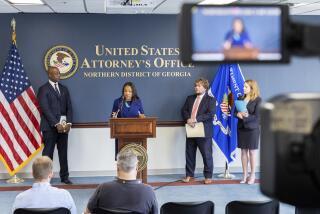Prison Abuse Reports May Insulate Bush From Blame
- Share via
WASHINGTON — A pair of milestone reports on Iraq’s Abu Ghraib prison this week redefined an abuse scandal that has dogged the Bush administration for months, vastly expanding the pool of potentially culpable soldiers and officers and stretching responsibility for the crisis to the upper reaches of the Defense Department.
The reports chastise senior leaders for failing to keep watch over the prison as it degenerated into chaos last fall. They criticize military and civilian brass at the Pentagon for failing to plan for a deadly insurgency, and for not moving quickly to counter it once it began.
Yet it is unclear whether the scandal’s most dramatic findings in months will tarnish an administration -- and hence the Bush reelection campaign -- that has so far proved resilient amid the crisis.
After half a dozen investigations and thousands of pages of official reports, criminal charges or disciplinary action against anyone outside the prison’s walls remain unlikely. The forced resignation of Defense Secretary Donald H. Rumsfeld -- who in May traveled to Abu Ghraib and declared himself “a survivor” -- has faded as a possibility.
Democratic presidential challenger John F. Kerry has sought to tie the White House to the horrific pictures that have emerged from the prison.
“We know what accountability and responsibility mean, and it’s not just the little person at the bottom who ought to pay the price of responsibility,” Kerry said Wednesday, calling for Rumsfeld’s removal. “The buck doesn’t stop at the Pentagon.”
But unlike a few months ago, significant pressure is unlikely to come from Capitol Hill.
In comments Wednesday, Sen. John W. Warner (R-Va.), chairman of the Armed Services Committee, showed little of the investigative zeal he had back in May after the scandal broke. Speaking at a Capitol Hill news conference, Warner said he expected to introduce no new legislation stemming from the abuse scandal this year, and gave Rumsfeld at least a lukewarm endorsement.
“This is a nation at war right now,” he said. “He has done his best.”
Although the reports -- one by a panel headed by former Defense Secretary James R. Schlesinger and one by a panel of Army generals -- are critical of top administration officials, some outside analysts believe that the reports insulate President Bush from the blame.
“The reports themselves are perceived as a sign the administration is trying to do its job right now, trying to do its best to clean up the mess,” said Clay Ramsay, research director for the University of Maryland’s Program on International Policy Studies. “They are at worst a wash for the president and possibly a little beneficial.”
A July poll by Ramsay’s program about the Abu Ghraib scandal found that voters for the most part did not connect the abuses to the administration.
“We found little sign at the time that people were directly connecting these circumstances to Bush as a person and a leader,” Ramsay said. “We also found that a majority did not connect it very directly to even the secretary of Defense.”
The Schlesinger report is the first Pentagon-ordered study to directly criticize war planners for U.S. missteps in Iraq, and it gave fodder to Rumsfeld’s critics who charge that the Pentagon went to war last year with far too few troops, and that military and civilian officials have failed to grasp the nature of the combatants in Iraq who are killing U.S. troops on a near-daily basis.
“Any defense establishment should adapt quickly to new conditions as they arise,” Schlesinger told reporters Tuesday. “And in this case, we were slow, at least in the judgment of the members of this panel, to adapt accordingly after the insurgency started in the summer of 2003.”
Schlesinger will not have the last word on Abu Ghraib. Results of another major investigation are due in September and the criminal charges likely to result from the generals’ report will lead to new trials and new debate over what happened at the prison and why. By then, however, the November election could be in the past.
Times staff writer Esther Schrader contributed to this report.
More to Read
Sign up for Essential California
The most important California stories and recommendations in your inbox every morning.
You may occasionally receive promotional content from the Los Angeles Times.













